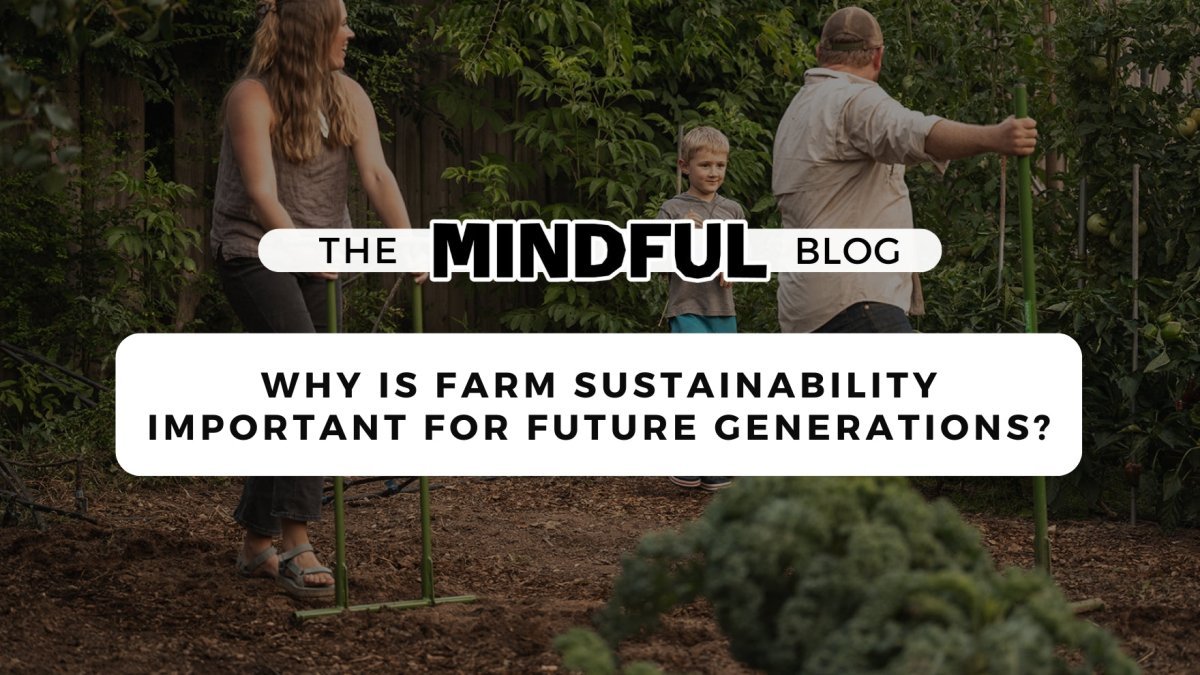
What Is Farm Sustainability?
Farm sustainability means cultivating the land today in a way that leaves it healthier and more productive for tomorrow. It’s about striking a balance between growing food efficiently, preserving natural resources, supporting local communities, and preparing for the challenges of a changing climate.
Sustainability isn’t a one-size-fits-all approach—it’s about adopting thoughtful, practical practices tailored to your land’s needs. At Mindful Farmer, we believe in providing tools and structures that make sustainable farming more accessible. From high tunnels that protect crops year-round to broadforks that aerate soil without disrupting its natural layers, and soil blockers that reduce plastic waste, these tools are built with longevity and environmental stewardship in mind.
Sustainability isn’t just a goal; it’s a mindset that ensures the land continues to thrive for generations to come.
Benefits of Farm Sustainability
Sustainable farming isn’t just good for the environment—it benefits everyone, from growers to consumers. Here’s how it makes an impact:
-
Healthier Soils and Ecosystems: Practices like crop rotation, soil aeration with tools such as broadforks, and water conservation nurture healthier soil and promote thriving ecosystems. This leads to more productive farmland and reduced environmental strain.
-
Improved Livelihoods: Sustainable methods help farmers cut costs, minimize risks from extreme weather, and access markets that prioritize eco-friendly practices. For small-scale growers, ergonomic tools like seeders and soil blockers make adopting sustainable practices more accessible and affordable.
-
Resilient Food Supply Chains: By improving crop diversity and yields, sustainability ensures future generations have access to healthy, reliable food options. It’s about building food systems that can withstand challenges while supporting biodiversity.
Focusing on sustainability is more than a farming practice—it’s a commitment to stewardship that protects and enhances the land for generations to come.
Challenges to Farm Sustainability
Sustainability is a goal worth striving for, but it does come with challenges:
-
Transition Costs: Switching to sustainable practices or investing in better tools, like our soil blockers, can feel daunting initially. However, these investments often pay off in the long run by increasing efficiency, improving yields, and reducing long-term costs.
-
Climate Uncertainty: Erratic weather patterns and shifting growing seasons create new challenges for farmers. Resilient systems, such as high tunnels, protect crops from harsh conditions and help farmers adapt to a changing climate.
-
Resistance to Change: It’s tempting to stick to familiar methods, but even small adjustments—like using a drop seeder to improve planting precision—can have a big impact on productivity and sustainability over time.
At Mindful Farmer, we’re here to help you overcome these challenges with innovative tools and practical solutions tailored to your farm’s needs. Sustainable farming is a journey, and every step forward matters.
Ways to Promote Farm Sustainability
Sustainability begins with small, purposeful actions. Here are a few ways to make a meaningful impact:
-
Invest in the Right Tools: Tools like broadforks and drop seeders can make sustainable practices simpler and more effective, from improving soil health to increasing planting efficiency.
-
Educate and Share: Sharing knowledge empowers others. Collaborate with local farming groups or follow reliable resources (like ours!) to stay informed and spread awareness about sustainable practices.
-
Support Local Economies: Buying locally sourced and sustainably grown food strengthens your community while encouraging ethical farming practices.
-
Advocate for Change: Use your voice to support policies and programs that prioritize sustainable farming. Change is possible when farmers, consumers, and advocates work together toward common goals.
Every choice you make toward sustainability not only benefits your farm but also contributes to the health of our planet and future generations.
Why It Matters
Farm sustainability goes beyond caring for the environment—it’s about ensuring farmers, communities, and ecosystems thrive together for generations to come.
At Mindful Farmer, we’re committed to supporting that journey with tools and resources built with real farms and farmers in mind.
Explore how products like broadforks, high tunnels, and soil blockers can help you cultivate a healthier, more productive farm while caring for your land. Visit our shop to learn more.
